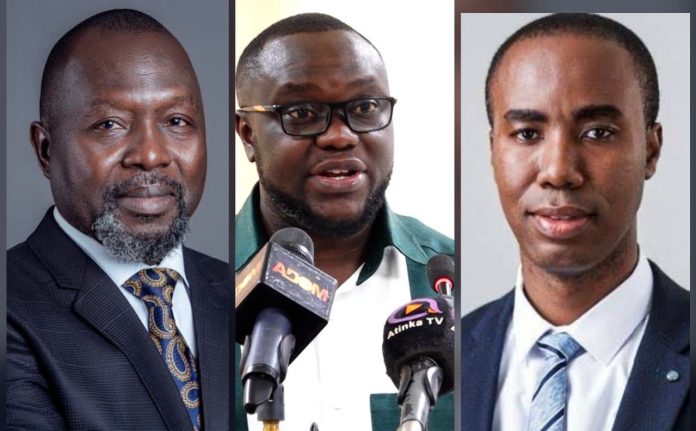The Parties Without Representation in Parliament have called on the Attorney-General to immediately withdraw the ongoing case against former National Signals Bureau (NSB) Director-General, Kwabena Adu-Boahene, citing what they describe as “media trial,” “incomplete investigations,” and “serious national security risks.”
At a press conference held in Accra on Tuesday, the group led by the General Secretary of the Great Consolidated Popular Party, Citizen Ato Dadzie, described the prosecution as politically motivated and legally flawed. They argued that recent evidence submitted by the Israeli company responsible for supplying a cyber defence system at the heart of the case contradicts the Attorney-General’s central claim — that the equipment was never delivered to the Government of Ghana.
“The Attorney-General is prosecuting a man based on allegations that have now been discredited by the supplier itself,” the group declared. “We therefore demand that the Attorney-General must withdraw the Republic vs Kwabena Adu-Boahene case from court, as the evidence clearly shows that investigations were shoddy and incomplete.”
The cyber defence system in question, the group revealed, was procured under a confidential agreement signed in 2020. According to a letter from International Security Consulting Holding Ltd. (I.S.C Holding Ltd.) dated May 28, 2025, all systems were delivered in full and are currently operational within Ghana’s national security infrastructure.
The Parties Without Representation argue that this revelation fundamentally undermines the legal basis of the case.
“If the very equipment being disputed is already in use by National Security, then what exactly is Mr. Adu-Boahene being tried for?” they asked. “This is not justice — it is persecution.”
They further criticised the conduct of the Attorney-General, Dr. Dominic Ayine, accusing him of using public commentary and press briefings to shape public opinion before trial proceedings have concluded.
“Justice must be served in the courtroom, not in the court of public opinion,” they said. “By turning this prosecution into a media spectacle, the Attorney-General is not only undermining due process but also endangering the confidentiality of our national security systems.”
The group described the public handling of the case as reckless, warning that openly discussing the details of a sensitive cybersecurity contract could expose the country to cyber threats and weaken its defence systems.
“In most mature democracies, issues of this nature are dealt with behind closed doors, not in press conferences. Ghana must not be the exception when it comes to protecting national security.”
Beyond the Adu-Boahene case, the group used the platform to question the overall credibility of the government’s anti-corruption drive. They claimed that cases involving officials linked to the ruling National Democratic Congress (NDC) have been quietly dropped, while those targeting former officials from the previous NPP administration are being pursued with what they call “media-driven aggression.”
“Justice has become selective. Prosecutions are launched with dramatic arrests and press coverage, but many end up collapsing in court or being quietly abandoned,” they said. “This double standard destroys public trust in the justice system.”
In a particularly scathing section, the group accused the Attorney-General’s office of lacking impartiality and abusing its power for political optics.
“The law, which should be a shield for every citizen, has become a sword to slash political opponents,” they said. “That is not democracy maturing — that is democracy in decline.”
The group ended the briefing by urging President Mahama and his administration to ensure that the fight against corruption is not hijacked for partisan purposes. They warned that pursuing cases without credible evidence wastes the court’s time and erodes the public’s faith in the justice system.
“The Attorney-General’s role is not to play politics with prosecutions but to uphold justice with integrity. Failing to do so reduces the office to an instrument of propaganda rather than a guardian of fairness.”
The group’s statement is likely to intensify pressure on the Attorney-General’s office, especially as questions grow over the integrity of several high-profile prosecutions announced under the President’s anti-corruption agenda.
Ghana|Atinkaonline.com|Ebenezer Madugu


























